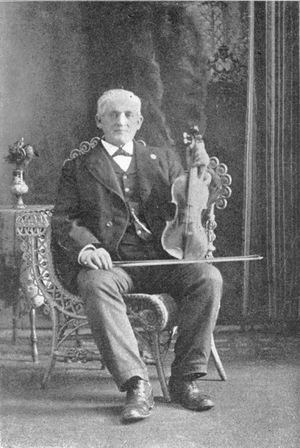Annotation:Doctor O'Neill (1): Difference between revisions
No edit summary |
No edit summary |
||
| (7 intermediate revisions by 3 users not shown) | |||
| Line 1: | Line 1: | ||
---------- | |||
---- | {{TuneAnnotation | ||
|f_tune_annotation_title= https://tunearch.org/wiki/Annotation:Doctor_O'Neill_(1) > | |||
'''DOCTOR O'NEILL [1]''' (An Doctur/Doctuir Ua Niall/Neill). Irish, Double Jig. D Major. Standard tuning (fiddle). AABBCCDDEE. Francis O'Neill (Irish Folk Music) says that the tune "created a sensation" when introduced to Chicago traditional musicians and dancers ("who had never heard" it before) by the elderly fiddler Edward Cronin, originally from Limerick Junction, County Tipperary. O'Neill thinks it "quite probable" it had originally been a clan march. O'Neill captured a performance of the tune | |f_annotation=[[File:cronin.jpg|300px|thumb|right|Edward Cronin]]'''DOCTOR O'NEILL [1]''' (An Doctur/Doctuir Ua Niall/Neill). Irish, Double Jig (6/8 time). D Major. Standard tuning (fiddle). AABBCCDDEE. Francis O'Neill ('''Irish Folk Music''', 1910) says that the tune "created a sensation" when introduced to Chicago traditional musicians and dancers ("who had never heard" it before) by the elderly fiddler Edward Cronin, originally from Limerick Junction, County Tipperary. O'Neill thinks it "quite probable" it had originally been a clan march. O'Neill captured a performance of the tune dating to around 1903 on a wax cylinder recording he made of the playing of Chicago fiddler John McFadden. | ||
|f_source_for_notated_version= "Cronin" [O'Neill]. Chicago fiddler Edward Cronin was born in the 1840's in Limerick Junction, County Tipperary, and was one of the finest fiddlers in the city in O'Neill's time. He had a large repertoire of tunes and allowed O'Neill to transcribe many of them in weekly visits for several years. Unfortunately, Cronin could also be suspicious, and tended to hold grudges. O'Neill's transcribing with him came to an abrupt halt when Cronin perceived he had been slighted in some way. | |||
|f_printed_sources= O'Neill ('''O'Neill's Irish Music'''), 1915; No. 135, p. 78. O'Neill (Krassen), 1976; p. 18. O'Neill ('''Music of Ireland: 1850 Melodies'''), 1903; No. 701, p. 130. O'Neill ('''Dance Music of Ireland: 1001 Gems'''), 1907; No. 6, p. 18. | |||
|f_recorded_sources=Comhaltas Ceoltoiri CL13, Tommy Peoples. | |||
|f_see_also_listing=See also listing at Alan Ng's Irishtune.info [http://www.irishtune.info/tune/523/]. | |||
}} | |||
------------- | |||
---- | |||
Latest revision as of 03:54, 12 December 2021
X:1 T:Doctor O'Neill [1] M:6/8 L:1/8 S:O'Neill - Dance Music of Ireland: 1001 Gems (1907), No. 6 Z:AK/Fiddler's Companion K:D dcd AFD|E2 F G2 A|~B3 Bcd|AGF EFA| d3 AFD|E2F G2A|BGB Bcd|AFD D2:| |:A|d3 ceA|dfe dcB|AFA Bcd|AGF EFA| d3 ceA|dfe dcB|AFA Bcd|AFD D2:| |:g|fef afd|ded fed|gbg faf|gee e2g| fef afd|ded fed|gbg fag|fdd d2:| |:g|fdf ece|dcB AFA|Afd Afd|AGF E2g| fdf ece|dcB AFA|AFA Bcd|AFD D2:| |:G|FAF GBG|FAG FED|FAF GBG|AGF E2G| FAF GBG|FAG FED|BGB Bcd|AFD D2:||


